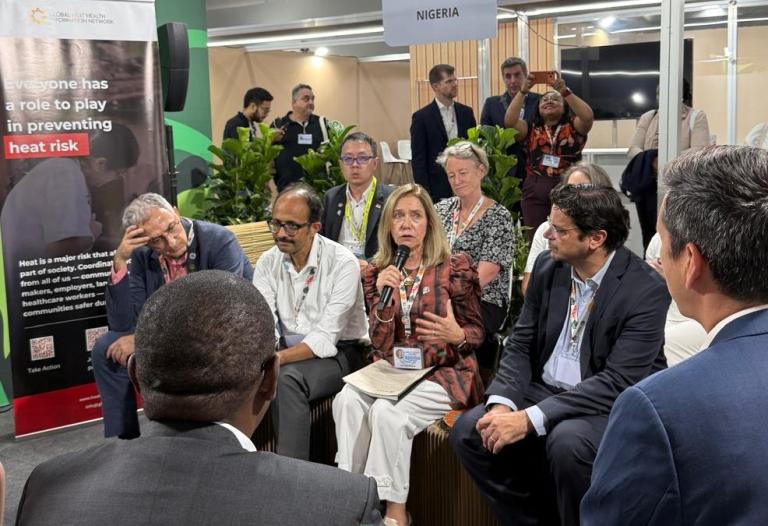As the world faces record-breaking temperatures, a new Extreme Heat Risk Governance Framework and Toolkit was launched today at COP30 to help countries strengthen governance, coordination, and investment in response to escalating heat risks.
The initiative recognizes that extreme heat has become one of the most deadly, economically and ecologically damaging, and least managed climate-related threats worldwide.
Extreme heat claims more than half a million lives every year and resulting in a record 639 billion potential work hours lost in 2024 - equal to USD 1 trillion, or 1% of global GDP. Cities are warming twice as fast as the global average, straining power and transport systems, while heat-driven crop losses are pushing millions into food insecurity.
"The World Meteorological Organization State of the Climate Update 2025 showed that 2025 is set to be one of the three warmest years on record. We are seeing an upsurge in extremes - dangerous daytime peaks, with little respite at night. Temperatures of more than 40 °C - sometimes 50 °C - are no longer the exception," said WMO Secretary-General Celeste Saulo.

The new Framework and Toolkit were developed by an international collaboration of national and global experts led jointly by WMO, the UN Office for Disaster Risk Reduction ( UNDRR ), the Global Heat Health Information Network ( GHHIN ), and Duke University. It responds to the UN Secretary-General's Call to Action on Extreme Heat.
It provides practical, evidence-based tools to help decision makers measure and understand the root causes and drivers of heat risk, and strengthen the governance systems needed to manage and adapt to its impacts.
The goal: to enable integrated planning, investment, and action by governments, financiers, and stakeholders across sectors and scales.
The Framework and Toolkit were unveiled at the high-level event "Extreme Heat Risk Governance: A New Framework and Toolkit for Accelerated Action" at COP30.
The event was hosted by Luxembourg with participation from Selwin Hart, Special Adviser and Assistant Secretary-General for Climate Action, Celeste Saulo, Secretary-General of WMO, Kamal Kishore, Special Representative of the UN Secretary-General for Disaster Risk Reduction, and representatives from national governments, development banks, city leaders, and international organizations including the Rockefeller Foundation, EBRD, and the CREWS Initiative.
Kamal Kishore, Head of UNDRR, underscored the significance of this milestone: "The broad engagement in shaping this Framework underscores a critical understanding: integrated, multi-sectoral, and multi-scale extreme heat risk governance is no longer optional - it is essential for survival," he said.
The toolkit was also promoted at COP30 Health Day on 13 November, which adopted the Belém Health Action Plan recognizing that climate and health are deeply interconnected. It calls for stronger foundations that link research, impact assessment, risk monitoring and early warning.

A global turning point for heat governance
By assessing their current governance maturity, countries can identify strengths and gaps, prioritize improvements, and advance toward integrated, systematic heat-risk reduction across short-, medium-, and long-term timeframes.
"This Framework provides partners with a clear path and concrete tools to move from fragmented efforts to coordinated systems that save lives and build resilience," said Joy Shumake-Guillemot, co-lead of the Global Heat Health Information Network . "It is practical, adaptable, and informed by science and experience."
The Framework emphasizes that heat risk governance is not just about temperature-it's about interdependencies. Extreme heat amplifies risks across sectors, triggering wildfires, poor air quality, power grid failures, transport disruptions, and food supply breakdowns. Managing these cascading impacts demands whole-of-society coordination.
Pilots in 2026: Barbados, Senegal, and Cambodia
In 2026, the Framework and Toolkit will be piloted in Barbados, Senegal, and Cambodia, with financial support from the Climate Risk and Early Warning Systems (CREWS) initiative, along with other participating countries across regions and governance contexts. These pilots will test practical tools for multi-sector coordination, financing, and anticipatory action-from prevention and preparedness to early warning and response.






